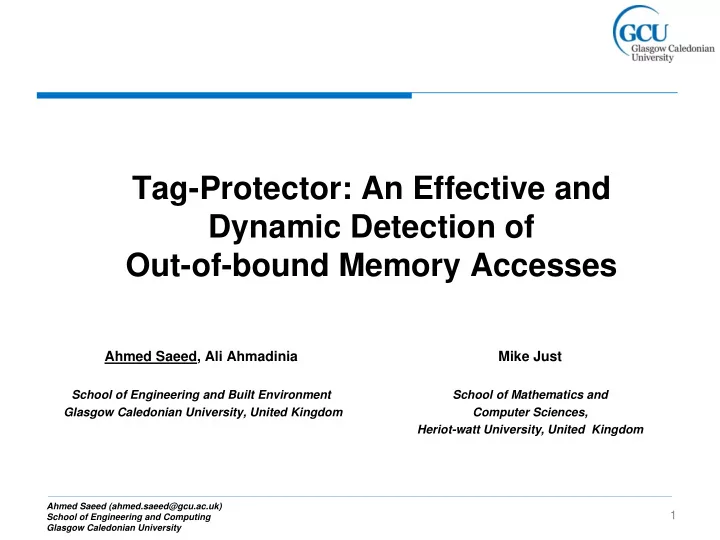

Tag-Protector: An Effective and Dynamic Detection of Out-of-bound Memory Accesses Ahmed Saeed, Ali Ahmadinia Mike Just School of Engineering and Built Environment School of Mathematics and Glasgow Caledonian University, United Kingdom Computer Sciences, Heriot-watt University, United Kingdom Ahmed Saeed (ahmed.saeed@gcu.ac.uk) 1 School of Engineering and Computing Glasgow Caledonian University
Outline Introduction Problem Statement Proposed solution Methodology Implementation Results and Discussion Conclusion Ahmed Saeed (ahmed.saeed@gcu.ac.uk) 2 School of Engineering and Computing Glasgow Caledonian University
Introduction Illegal memory accesses (IMAs) are major concerns in applications written with programming languages like C/C++. Typical programming errors: out-of-bound array indexing and dangling pointer dereferences Spatial IMA :more commonly known as buffer overflow Temporal IMA: also known as use-after-free access Ahmed Saeed (ahmed.saeed@gcu.ac.uk) 3 School of Engineering and Computing Glasgow Caledonian University
Problem Statement Increase in software content and network connectivity. Software is not fully trustable. Software-based attacks: Stack smashing through buffer overflows Illegal memory reads and writes Protect System/Data / Programs against Extraction of secret information: Data confidentiality Modification in the behavior: Data integrity Denial of service: Availability Ahmed Saeed (ahmed.saeed@gcu.ac.uk) 4 School of Engineering and Computing Glasgow Caledonian University
Proposed Solution Detect IMAs dynamically through tag based protection Based on source code instrumentation through LLVM compiler framework Targets data confidentiality and integrity attacks. Effectiveness evaluated through various benchmark suites and testbed codes Presented lower memory and performance overhead Ahmed Saeed (ahmed.saeed@gcu.ac.uk) 5 School of Engineering and Computing Glasgow Caledonian University
Methodology Require application source code Implementation is based on following steps. Convert code in to Intermediate Representation(IR) Detect memory allocations instructions Link each memory objects with a special tag Detect memory access instructions. Insert tag address and value check instructions Ahmed Saeed (ahmed.saeed@gcu.ac.uk) 6 School of Engineering and Computing Glasgow Caledonian University
Methodology Ahmed Saeed (ahmed.saeed@gcu.ac.uk) 7 School of Engineering and Computing Glasgow Caledonian University
Implementation Figure 2: Tag-Protection implementation block diagram Ahmed Saeed (ahmed.saeed@gcu.ac.uk) 8 School of Engineering and Computing Glasgow Caledonian University
Implementation Ahmed Saeed (ahmed.saeed@gcu.ac.uk) 9 School of Engineering and Computing Glasgow Caledonian University
Results and Discussion Ahmed Saeed (ahmed.saeed@gcu.ac.uk) 10 School of Engineering and Computing Glasgow Caledonian University
Results and Discussion Ahmed Saeed (ahmed.saeed@gcu.ac.uk) 11 School of Engineering and Computing Glasgow Caledonian University
Results and Discussion Ahmed Saeed (ahmed.saeed@gcu.ac.uk) 12 School of Engineering and Computing Glasgow Caledonian University
Results and Discussion Ahmed Saeed (ahmed.saeed@gcu.ac.uk) 13 School of Engineering and Computing Glasgow Caledonian University
Conclusion A fast and effective tag-protection solution to detect illegal memory accesses. Implemented as an instrumentation pass using LLVM and operates at source-code level. Less performance overhead when compared with the publicly available tools. Ahmed Saeed (ahmed.saeed@gcu.ac.uk) 14 School of Engineering and Computing Glasgow Caledonian University
Any Questions? Ahmed Saeed (ahmed.saeed@gcu.ac.uk) 15 School of Engineering and Computing Glasgow Caledonian University
Recommend
More recommend